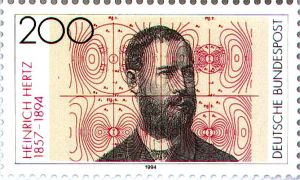Wikisage, the free encyclopedia of the second generation, is digital heritage
Heinrich Hertz: Difference between revisions
Jump to navigation
Jump to search
(wlink) |
mNo edit summary |
||
| (One intermediate revision by the same user not shown) | |||
| Line 1: | Line 1: | ||
{| class="wikitable" | {| class="wikitable" | ||
|[[File:Heinrich Hertz Deutsche-200-1Kcs.jpg|thumb]] | |[[File:Heinrich Hertz Deutsche-200-1Kcs.jpg|thumb]] | ||
(Hamburg, 22 februari 1857 – Bonn, 1 januari 1894) was een Duits natuurkundige die vooral bekend werd vanwege de ontdekking van radiogolven. Naar hem is de SI-eenheid van frequentie, de [[hertz]], genoemd. | ([[Hamburg]], 22 februari 1857 – [[Bonn]], 1 januari 1894) was een Duits natuurkundige die vooral bekend werd vanwege de ontdekking van radiogolven. Naar hem is de SI-eenheid van frequentie, de [[hertz]], genoemd. | ||
|| | ||Heinrich Rudolph Hertz was a German physicist who first conclusively proved the existence of electromagnetic waves theorized by James Clerk Maxwell's electromagnetic theory of light. Hertz proved the theory by engineering instruments to transmit and receive radio pulses using experimental procedures that ruled out all other known wireless phenomena. The unit of frequency – cycle per second – was named the "hertz" in his honor | ||
==Links== | |||
{{Wikidata|Q41257}} | |||
http://web.archive.org/web/20090925102542/http://chem.ch.huji.ac.il/history/hertz.htm | |||
|} | |} | ||
[[Category:German physicists]] | |||
[[nl:Heinrich Hertz]] | [[nl:Heinrich Hertz]] | ||
Latest revision as of 15:18, 28 February 2016
 (Hamburg, 22 februari 1857 – Bonn, 1 januari 1894) was een Duits natuurkundige die vooral bekend werd vanwege de ontdekking van radiogolven. Naar hem is de SI-eenheid van frequentie, de hertz, genoemd. |
Heinrich Rudolph Hertz was a German physicist who first conclusively proved the existence of electromagnetic waves theorized by James Clerk Maxwell's electromagnetic theory of light. Hertz proved the theory by engineering instruments to transmit and receive radio pulses using experimental procedures that ruled out all other known wireless phenomena. The unit of frequency – cycle per second – was named the "hertz" in his honor
Links
|